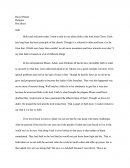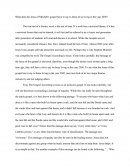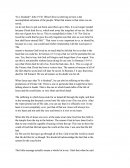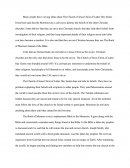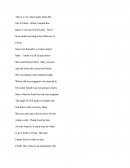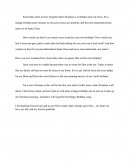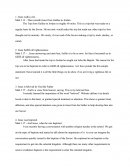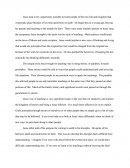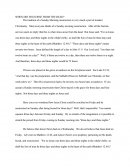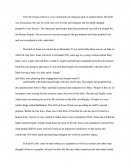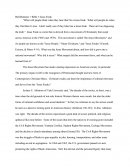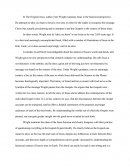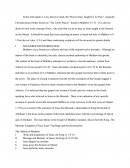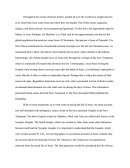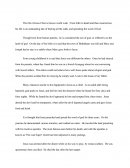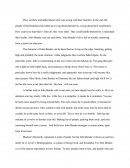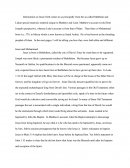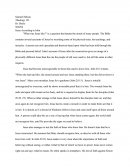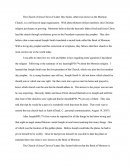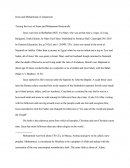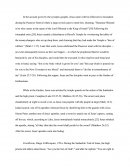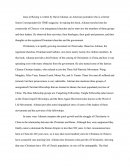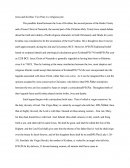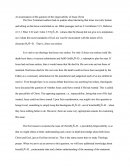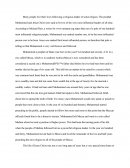Jesus essays and research papers
Last update: April 26, 2022-
Faith in the Lord Jesus Christ
David Palmer Religion Bro allred faith Hello and welcome today I want to talk to you about faith in the lord Jesus Christ. Faith has long been the basic principle of the church. Though it is referred to often and basic it is far from that. If faith were basic then couldn't we all move mountains and have miracles everyday? I say that faith is biased on a lot of different things. In the old
Rating:Essay Length: 927 Words / 4 PagesSubmitted: July 18, 2010 -
Jesus In The Year 2000
What does the Jesus of Mitchell's gospel have to say to those of us living in the year 2000? The true test of a literary work is the test of time. If a work has a universal theme, if it has a universal lesson that can be learned, it will last and be referred to as a classic and generation after generation of students will read and discuss it in school. While the Gospels are
Rating:Essay Length: 874 Words / 4 PagesSubmitted: August 24, 2010 -
Jesus
"It is finished!" John 19:30. What Christ is referring to here is the accomplished salvation of the people. What that means is that when we are saved, we do not have to put out burnt saccrifices up to Him. It is no longer needed because Christ died for us, which took away the iniquities of our sin. He did this out of great love for us. This is exemplified in John 3:16 "For God so
Rating:Essay Length: 1,298 Words / 6 PagesSubmitted: September 3, 2010 -
The Church Of Jesus Christ Of Latter Day Saints
Many people have varying ideas about The Church of Jesus Christ of Latter Day Saints. It has been said that the Mormons are a cult out to destroy the beliefs of the other Christian churches. Some believe that they are not a true Christian church, that they hide their beliefs from investigators of their religion, and they keep important details of their religion secret until after you have become a member. It is also said
Rating:Essay Length: 433 Words / 2 PagesSubmitted: September 8, 2010 -
Jesus
This is a very short paper about the life of Christ. When I started this paper it was out of mere joke. Now I have ended up being a true follower of Christ. Jesus was borned to a virgin named Mary. I think we all at lease know that much about Christ. Mary was not married when she conceived Christ. She was dating a man named Joseph. Whom she was engaged to be married to.
Rating:Essay Length: 273 Words / 2 PagesSubmitted: September 9, 2010 -
Jesus
Some folks seem to have forgotten that Christmas is a birthday party for Jesus. It's a strange birthday party because no one gives Jesus any presents, and the most important person seems to be Santa Claus. How would you feel if you weren't even invited to your own birthday? How would you feel if everyone gave gifts to each other but had nothing for you, not even a kind word? And how would you
Rating:Essay Length: 262 Words / 2 PagesSubmitted: September 27, 2010 -
Jesus' Traits
1. Jesus walks a lot... Matt 3:13 - Then cometh Jesus from Galilee to Jordan... The Trip from Galilee to Jordan is roughly 60 miles. This is a trip that was made on a regular basis by the Savior. He not only would make this trip but made any other trips by foot thought out his ministry. We rarely, if ever read of the Savior making a trip by mule, donkey, or camel. 2. Jesus
Rating:Essay Length: 5,624 Words / 23 PagesSubmitted: October 15, 2010 -
Jesus
Jesus took every opportunity possible to teach people of the new life and kingdom that would take place because of his time spent here on earth. He began this at a young age, leaving his parents and teaching in the temple for days. There were many teachers present in Jesus' time; the uniqueness Jesus brought to the earth was his style of teaching. Most teachers would teach on the laws of Moses and recite scripture.
Rating:Essay Length: 691 Words / 3 PagesSubmitted: October 19, 2010 -
When Did Jesus Rise From The Dead
WHEN DID JESUS RISE FROM THE DEAD? The tradition of a Sunday Morning resurrection is very much a part of modern Christianity. Most everyone thinks of a Sunday morning resurrection. After all the Sunrise services seem to imply that this is when Jesus arose from the dead. But Jesus said, "For as Jonas was three days and three nights in the whale's belly; so shall the Son of man be three days and three nights
Rating:Essay Length: 1,632 Words / 7 PagesSubmitted: October 27, 2010 -
Life Of Jesus Christ
The life of Jesus Christ is a very emotional yet religious topic to explain about. His birth was miraculous, the way he lived was very sin free and religious and his death changed people\\\'s lives forever. The innocence and loyalty that Jesus portrayed was still not enough for the Roman Empire. He was just too over powering for the government and other peoples lives and was considered a risky individual. The birth of Jesus was
Rating:Essay Length: 1,028 Words / 5 PagesSubmitted: October 28, 2010 -
Bell Bottoms + Bible = Jesus Freak
Bell-Bottoms + Bible = Jesus Freak "What will people think when they hear that I'm a Jesus freak. What will people do when they find that it's true. I don't really care if they label me a Jesus freak. There ain't no disguising the truth." Jesus Freak is a term that is derived from a movement of Christianity that swept across America in the 1960's and 1970's. This movement is called "the Jesus Movement;" and
Rating:Essay Length: 3,332 Words / 14 PagesSubmitted: November 2, 2010 -
The Original Jesus
In The Original Jesus, author Tom Wright examines Jesus in the historical perspective. He attempts to take you back to Jesus's own time in order for the reader to recognize the message Christ was actually proclaiming and to interpret it and the Gospels in the context of those times. In other words, Wright tries to "take you there" to see Jesus as he was 2,000 years ago. It is a short and seemingly uncomplicated book,
Rating:Essay Length: 393 Words / 2 PagesSubmitted: November 4, 2010 -
Prayer Jesus Taught Us To Pray
In this term paper it is my desire to study the "Prayer Jesus Taught Us To Pray", using the Christian prayer better known as "The Lord's Prayer", found in Matthew 6.5-13. It is also my desire to look at the concept of how, why and what we are to pray as Jesus taught in the Sermon on the Mount. It should be noted that Jesus teaching on prayer is found not only in Matthew 6.9-13
Rating:Essay Length: 673 Words / 3 PagesSubmitted: November 4, 2010 -
Jesus Of Nazareth
Throughout the course of human history, people all over the world have sought answers as to where they have come from and where they are headed. Out of this comes organized religion, and almost always an accompanying figurehead. For the Jews, this figurehead might be Moses, or even Abraham; for Muslims, it is Allah; and for the approximately one third of the global population that practices some form of Christianity, that person is Jesus of
Rating:Essay Length: 2,192 Words / 9 PagesSubmitted: November 5, 2010 -
Lives Of Jesus And Mohammad
The life of Jesus Chist is known world wide. From bithr to death and then resurrection, his life is an outstanding tale of beeting all the odds, and spreading the word of God. Though born from human parents, he is considered the son of god, or reffered to as the lamb of god. On the day of his birth it is said that the town of Bethlaham was full and Mary and Joseph had
Rating:Essay Length: 804 Words / 4 PagesSubmitted: November 5, 2010 -
Jesus
They sat there and talked about what was wrong with their families. In the end, the people of the breakfast club ended up crying about themselves, crying about their misfortunes. How could you stop them? After all, they were older. They could handle themselves. Understand their bodies. John Bender was one such body. John Bender's life is full of trouble, stemming from a desire for attention. The character of John Bender can be described
Rating:Essay Length: 645 Words / 3 PagesSubmitted: November 5, 2010 -
Jesus And Mohammad
Information on Jesus' birth comes to us principally from the so-called Matthean and Lukan special material, material unique to Matthew and Luke. Matthew's account is told from Joseph's perspective, whereas Luke's account is from that of Mary. Then there is Mohammed born in c. 570, in Mecca which is now known as Saudi Arabia. He is best known as the founding prophet of Islam. In the next pages, I will be telling you how they
Rating:Essay Length: 1,381 Words / 6 PagesSubmitted: November 6, 2010 -
Jesus According To John
Samuel Nelson Theology 101 Dr. Boyle 9/26/04 Jesus According to John "What was Jesus like?" is a question that haunts the minds of many people. The Bible contains several accounts of Jesus by recording some of his physical traits, his teachings, and miracles. A person can only speculate and theorize based upon what has been told through the Bible and personal belief. John's account of Jesus after the resurrection gives an image of a physically
Rating:Essay Length: 514 Words / 3 PagesSubmitted: November 7, 2010 -
The Church Of Jesus Christ Of Latter Day Saints
The Church of Jesus Christ of Latter Day Saints, otherwise known as the Mormon Church, is a well known large organization. With about thirteen million members, this Christian religion just keeps on growing. Mormons believe that the heavenly father (God) and Jesus Christ lead the church through revelations given to the President or present day prophet. They also believe that a man named Joseph Smith translated a sacred book called the Book of Mormon. With
Rating:Essay Length: 2,261 Words / 10 PagesSubmitted: November 7, 2010 -
Jesus And Mohammad
Jesus and Mohammad a Comparison Tracing the lives of Jesus and Mohammed historically Jesus was born in Bethlehem BCE 4 to Mary who was at that time a virgin. (Living Religions, Sixth Edition, by Mary Pat Fisher. Published by Prentice-Hall. Copyright Ð'© 2005 by Pearson Education, Inc.,p 295) (Luke 1:26вЂ"38). Jesus was raised in the town of Nazareth in Galilee. Other than a journey to Egypt when he was an infant and a trip to
Rating:Essay Length: 2,074 Words / 9 PagesSubmitted: November 11, 2010 -
Jesus Arrest, Trial, And Death
In the account given by the synoptic gospels, Jesus came with his followers to Jerusalem during the Passover festival where a large crowd came to meet him, shouting, "Hosanna! Blessed is he who comes in the name of the Lord! Blessed is the King of Israel!"[19] Following his triumphal entry,[20] Jesus created a disturbance at Herod's Temple by overturning the tables of the moneychangers who set up shop there, and claiming that they had made
Rating:Essay Length: 575 Words / 3 PagesSubmitted: November 11, 2010 -
Jesus In Beijing
Jesus in Beijing is written by David Aikman, an American journalist who is a former Senior Correspondent for TIME magazine. In making this book, Aikman traveled into the countryside of China to visit unregistered churches and to interview the members of these groups and their leaders. He observed their activities, their theologies, their goals and passions, and their thoughts on the registered Protestant churches and the government. Christianity is a rapidly growing movement in China
Rating:Essay Length: 690 Words / 3 PagesSubmitted: December 6, 2010 -
Jesus And Krishna
Jesus and Krishna: Two Peas in a religious pod The parallels found between the lives of Krishna, the second person of the Hindu Trinity and of Jesus Christ of Nazareth, the second part of the Christian Holy Trinity have raised debate about the truth and validity of both religious characters in both Christianity and Hindu for years. Krishna was considered to be the incarnation of the God Vishnu. He is thought to have lived on
Rating:Essay Length: 1,675 Words / 7 PagesSubmitted: December 7, 2010 -
Jesus
An examination of the question of the impeccability of Jesus Christ The New Testament authors had no qualms about declaring that Jesus was truly human and telling us that Jesus committed no sin. Bible passages such as 2 Corinthians 5:21, Hebrews 4:15, 1 Peter 2:22 and 1 John 3:5 пÑ--Ð...witness that He [Jesus] did not give in to temptation, nor violate the moral standards of God, nor was He inconsistent with the nature of his
Rating:Essay Length: 334 Words / 2 PagesSubmitted: December 12, 2010 -
Jesus And Mohammad
Many people live their lives following a religious leader of some religion. The prophet Mohammed and Jesus Christ were said to be two of the very most influential leaders of all time. According to Michael Hart, a writer for www.amaana.org states that out of a pole of one hundred most influential religious people, Mohammed was ranked number one, to be the most influential person ever to be born. Jesus was ranked third most influential person,
Rating:Essay Length: 1,183 Words / 5 PagesSubmitted: December 14, 2010
